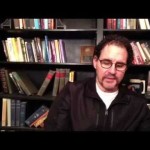We run our website the way we wished the whole internet worked: we provide high quality original content with no ads. We are funded solely by your direct support. Please consider supporting this project.

The Open View and Predestination
Paul wrote in Ephesians, “For he [God] chose us in him before the creation of the world to be holy and blameless in his sight. In love he predestined us for adoption to sonship through Jesus Christ …” (Eph 1:3-4).
Some argue that the particular way Scripture portrays God’s providential plan is incompatible with the belief that agents determine their futures. Scriptures like this one unequivocally depict God as certain that he will have a people for himself, a bride. But if God did not predestine or at least foreknow that anyone in particular would accept his invitation, then, it might be argued, he simply could not be certain of this. It seems that God’s goal for world history could fail and that Satan could win this conflict after all.
Here are two things to consider. First, in giving humans a nature that includes self-determining will, God set the parameters of human freedom. As Creator, he knows humans exhaustively, infinitely better than any human could ever know them. Sociologists, advertisers and insurance companies are able to accurately predict the behavior of large groups of people, but they cannot predict the behavior of any particular individual within these groups. If this is the case, then how much more should we assume that God is able to predict the behavior of large groups of people over long periods of time?
The Lord knew from the beginning that human rebellion was a possibility, if not an inevitability. This possibility was inherent in the gift of self-determination that God gave to humanity. The Lord also knew that if a fall were to occur, a certain percentage of people might reject his offer of salvation in spite of his incarnation and the constant, loving intervention of the Holy Spirit. But the Lord also foreknew that a certain percentage range of people would, through faith and by means of his grace, accept his saving love. He would be able to do this without determining, and thus foreknowing, which individuals would and would not belong to his bride.
Second, the Lord could know from the start that he would certainly have a bride on the basis of his perfect knowledge of his own character and ability. He is the Lord of love who refuses to give up. Even if it were possible for entire generations completely to rebel against him, the Lord knew before he entered into this plan that he was willing to do whatever it took and to work for however long it might take to see his creation bear the fruit he was seeking.
Here’s a story that illustrates this point. Since the time of Abraham, the Lord patiently had been building a people who would love him and function as a nation of priests to reach the whole world. But the people who belonged to this nation rebelled to the point where the Lord was ready to destroy them all and start over with Moses (Ex 32:9-10). This degree of rebellion, which reoccurred later in Israel’s history, surprised God presumably because the possibility of this level of obstinacy was so remote (See Jer 3:7). But in a world of free agents, sometimes the improbable comes to pass. In this instance, Moses persuaded God to “change his mind” about the destruction he had planned for Israel. The episode demonstrates how the Lord is willing and able to move forward with his plans even when people choose to thwart his will for their lives.
On this basis we can understand how the Lord can have complete assurance that his overall goals will be accomplished, even while being uncertain as to who will and will not submit to these goals. God is determined—he has predestined—that there would be a bride, and he will not give up until this goal is achieved.
—Adapted from Satan and the Problem of Evil, 155-158
Image by Keith Misner
Category: General
Tags: Divine Foreknowledge, God's Character, Open Theism, Predestination, Satan and the Problem of Evil, freedom
Topics: Open Theism
Related Reading

Podcast: What Does God Actually DO in the World?
Greg discusses what a God, who takes his hands off of us, who gives up control for us, who accommodates for us, actually does in the world. http://traffic.libsyn.com/askgregboyd/Episode_0215.mp3

The Future of Theology
Chris Moore via Compfight Roger Olson recently published a blog arguing that there really are no new ideas out there in the realm of theology. Everything has pretty much been thought of or proposed. That idea or book that’s causing such a stir? Rewarmed material that someone else already thought of. So what is there…

Jesus and His Father
Greg addresses a question from a reader about the nature of the Godhead. If Jesus is the exact representation of the Father, what does this mean about the Trinity, if there are indeed three distinct persons?

How do you respond to Matthew 26:36?
At the last supper Jesus said to Peter, “Truly I tell you, this very night, before the cock crows, you will deny me three times.” This is probably the most frequently quoted verse by defenders of the classical understanding of God’s foreknowledge against the open view. How, they ask, could Jesus have been certain Peter…

Podcast: Is Open Theism Growing in the World?
Greg discusses the place of Open Theism in contemporary Christianity. http://traffic.libsyn.com/askgregboyd/Episode_0149.mp3
